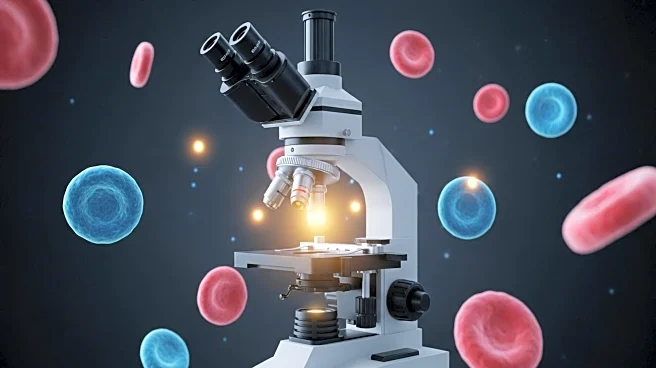What is the story about?
What's Happening?
CLISEQ Ltd., 10x Genomics, and the Weizmann Institute have initiated a multi-year international clinical research study to explore the use of single cell RNA sequencing as a non-invasive alternative to bone marrow aspiration for diagnosing hematologic disorders. The PERIBLOOD trial, sponsored by the Weizmann Institute, aims to enroll over 1,500 participants globally, including individuals with varying blood counts and healthy volunteers. The study will compare single cell profiles from peripheral blood with traditional bone marrow results to assess the feasibility of this approach for diagnosing conditions like Myelodysplastic Syndromes (MDS). This collaboration leverages 10x Genomics' Chromium GEM-X Single Cell technology to generate detailed molecular profiles from blood samples, potentially revealing subtle signals missed by conventional testing.
Why It's Important?
The study represents a significant advancement in hematology diagnostics, offering a less invasive and potentially more accessible method for diagnosing blood disorders. If successful, this approach could transform clinical practices by reducing the need for painful and costly bone marrow procedures, thereby improving patient compliance and outcomes. The collaboration between CLISEQ, 10x Genomics, and the Weizmann Institute could pave the way for new diagnostic products, enhancing the understanding and treatment of hematologic conditions. This development is crucial for patients and healthcare providers, as it promises to streamline diagnostics and improve therapeutic monitoring.
What's Next?
The PERIBLOOD trial is set to expand to additional sites and indications, aiming to improve diagnostics for blood malignancies. As the study progresses, findings could inform future efforts to develop assays that enhance patient care and clinical decision-making. Stakeholders in the healthcare industry, including researchers and clinicians, will be closely monitoring the trial's outcomes to assess its impact on diagnostic practices. The success of this study could lead to broader adoption of single cell technology in clinical settings, potentially influencing policy and investment in hematology diagnostics.
Beyond the Headlines
The trial's focus on single cell technology highlights the growing importance of precision medicine in healthcare. By enabling detailed insights from simple blood draws, this approach aligns with broader trends towards personalized and minimally invasive diagnostics. The collaboration also underscores the role of international partnerships in advancing scientific research, as institutions from multiple continents contribute to this groundbreaking study. Ethical considerations regarding patient consent and data privacy will be crucial as the trial expands, ensuring that advancements in technology are matched by responsible research practices.















